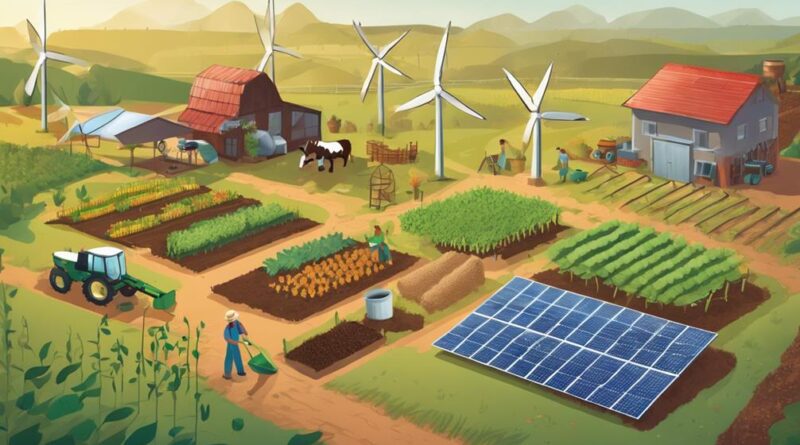Sustainable Techniques for Greener Farming Practices
Embrace sustainable farming techniques like crop rotation and composting for greener practices. Optimize water use with strategic irrigation and rainwater harvesting. Control pests naturally through companion planting and balanced ecosystems. Enhance soil health with biodiversity promotion. Boost ecosystem stability by nurturing predator-prey relationships. Integrate renewable energy sources such as solar and wind power, along with waste reduction initiatives. These methods revolutionize agriculture, prioritizing eco-friendly solutions that benefit both the environment and farming productivity. Discover how these sustainable techniques can transform your farming practices towards a greener future.
Crop Rotation
Why is crop rotation a vital practice in modern agriculture?
Crop rotation plays a crucial role in sustainable farming by promoting nutrient cycling, disease prevention, and ultimately leading to improved yields. By rotating crops, you can effectively manage soil fertility as different plants have varying nutrient needs. For instance, legumes like peas and beans are known for fixing nitrogen in the soil, which benefits subsequent crops that require this essential nutrient. This practice helps prevent depletion of specific nutrients, ensuring the soil remains fertile for future harvests.
Moreover, crop rotation aids in disease prevention. Planting the same crop in the same field year after year can lead to a buildup of pathogens that target that particular plant. By rotating crops, you disrupt the life cycles of pests and diseases, reducing their prevalence. This natural approach decreases the reliance on chemical pesticides, aligning with sustainable farming practices.
Furthermore, implementing crop rotation has been linked to improved yields. Different plants have varying root structures and nutrient uptake abilities. By alternating crops, you can break up soil compaction, improve soil structure, and enhance water retention. These factors contribute to healthier plants with access to a broader range of nutrients, ultimately leading to better yields per acre.
Composting Methods
To further enhance your sustainable farming practices and continue optimizing soil health, exploring efficient composting methods is key. Composting is a powerful tool that facilitates nutrient recycling and boosts organic matter content in the soil. By understanding the different composting techniques available, you can tailor your approach to suit your specific needs and resources.
- Aerobic Decomposition: Utilizing aerobic decomposition in composting involves providing oxygen to the microorganisms breaking down the organic material. This method tends to be faster and produces compost with higher nutrient levels.
- Anaerobic Digestion: In contrast, anaerobic digestion occurs in an environment with limited oxygen. This process is slower but can handle a wider variety of organic materials, including food waste and manure. It's crucial to monitor the process closely to avoid unpleasant odors.
- Vermicomposting: Vermicomposting, or composting with worms, is another effective method. These worms consume organic waste and produce nutrient-rich castings that improve soil structure and fertility. It's a great option for smaller-scale operations or indoor composting.
Water Conservation Strategies
Implementing strategic irrigation schedules and adopting water-efficient technologies are essential components of effective water conservation strategies for sustainable farming practices. Drip irrigation, for instance, is a modern technique that delivers water directly to the roots of plants, minimizing wastage through evaporation or runoff. This method not only conserves water but also promotes plant growth by ensuring that crops receive an adequate and consistent water supply.
Rainwater harvesting is another innovative approach to water conservation. By collecting and storing rainwater, farmers can reduce their dependence on traditional water sources such as rivers or wells. This stored rainwater can then be used for irrigation, especially during dry seasons when water is scarce. Integrating rainwater harvesting systems with drip irrigation technologies can significantly enhance water efficiency on farms.
To optimize water conservation efforts, it's crucial to monitor soil moisture levels regularly. By using moisture sensors or conducting simple soil tests, you can determine the water needs of your crops more accurately. This data can help you adjust your irrigation schedules accordingly, ensuring that you aren't overwatering or underwatering your plants.
Natural Pest Control
For effective pest management in farming, integrating natural pest control methods is crucial for sustainable and environmentally friendly practices. Utilizing biological control methods can help maintain a balanced ecosystem and reduce the reliance on chemical pesticides. Incorporating companion planting is another innovative technique that can enhance natural pest control on your farm. By strategically planting mutually beneficial crops together, you can naturally repel pests and attract beneficial insects, creating a more harmonious environment for your crops to thrive.
- Biological Control: Introducing natural predators like ladybugs or lacewings to feed on pests such as aphids can effectively reduce pest populations without harming the environment.
- Companion Planting: Pairing plants like marigolds with vegetables like tomatoes can deter harmful insects due to the marigolds' natural pest-repelling properties.
- Crop Rotation: Rotating crops seasonally can help break pest cycles, as different crops attract different pests, reducing the overall pest pressure on your farm.
Soil Health Management
Enhancing soil vitality through strategic management practices is essential for maximizing agricultural productivity and sustainability. Soil health management revolves around two crucial components: soil testing and nutrient management. Soil testing is a fundamental practice that allows you to understand the current state of your soil. By analyzing its pH levels, nutrient content, and structure, you can develop targeted strategies to improve its health. Regular soil testing enables you to make informed decisions regarding nutrient applications, ensuring that you provide your crops with the necessary elements for optimal growth.
Nutrient management is another key aspect of soil health management. Once you have identified the deficiencies in your soil through testing, you can implement precise nutrient management practices. This involves the strategic application of fertilizers or organic amendments to replenish the soil with essential nutrients. By customizing your nutrient management approach based on soil test results, you can avoid over-application of chemicals, reduce nutrient runoff, and promote a balanced and sustainable soil ecosystem.
Incorporating soil testing and nutrient management into your farming practices is a proactive step towards enhancing soil health. By understanding your soil's needs and providing targeted care, you can improve its fertility, structure, and overall productivity. Prioritizing soil health management not only benefits your current crops but also contributes to the long-term sustainability of your farm.
Biodiversity Promotion
To optimize your farm's sustainability and ecosystem health, embracing biodiversity promotion practices plays a pivotal role in fostering resilience and ecological balance. By incorporating habitat restoration techniques, you can create diverse ecosystems that support a wide range of plant and animal species. This not only enhances biodiversity but also improves soil health and nutrient cycling.
Utilizing agroforestry practices introduces a symbiotic relationship between crops and trees, fostering a more resilient and productive farm. Trees provide shade, wind protection, and act as carbon sinks, while their roots improve soil structure and prevent erosion. This integrated approach maximizes land use efficiency and promotes biodiversity by offering varied habitats for different species.
Implementing wildlife corridors on your farm can significantly benefit local fauna by providing safe passage between fragmented habitats. These corridors enhance genetic diversity, enable species migration, and reduce the risk of inbreeding. By strategically planning and maintaining these wildlife pathways, you can support the natural balance of predator-prey relationships and contribute to overall ecosystem stability.
Renewable Energy Integration

Consider incorporating renewable energy sources into your farming operations to enhance sustainability and reduce environmental impact. By utilizing solar power and implementing wind energy, you can significantly reduce your carbon footprint and lower your reliance on non-renewable energy sources.
Solar power utilization involves installing solar panels on your farm buildings or open land to harness the sun's energy and convert it into electricity. This renewable energy source can power various aspects of your farm, such as lighting, irrigation systems, and machinery. Additionally, excess energy can be stored in batteries for use during periods of low sunlight.
Wind energy implementation entails setting up wind turbines on your property to capture the wind's kinetic energy and convert it into electricity. Wind power can be particularly beneficial in areas with consistent wind patterns. By integrating wind energy into your farming operations, you can supplement your electricity needs and contribute to a greener grid.
Both solar power and wind energy offer sustainable alternatives to traditional fossil fuels, helping you reduce greenhouse gas emissions and mitigate climate change. By embracing renewable energy sources, you not only promote environmental stewardship but also potentially lower your energy costs in the long run. Make the shift towards renewable energy integration, and pave the way for a more sustainable and eco-friendly farming future.
Waste Reduction Initiatives
How can waste reduction initiatives optimize the efficiency and sustainability of your farming practices? Implementing strategies to minimize food waste and packaging waste can lead to significant improvements in your overall farm operations. By focusing on waste reduction, you not only contribute to a healthier environment but also streamline your processes for enhanced productivity.
- Composting: Setting up a composting system on your farm can help recycle organic waste such as leftover fruits and vegetables. This compost can then be used as nutrient-rich soil for your crops, closing the loop on food waste and promoting sustainability.
- Reusable Packaging: Embracing reusable packaging solutions can drastically reduce the amount of packaging waste generated on your farm. Switching to durable containers that can be refilled or returned by customers can minimize single-use plastics and cardboard waste.
- Precision Monitoring: Utilizing technology for precise monitoring of inventory and production processes can help identify areas where waste is being generated. By pinpointing these inefficiencies, you can implement targeted solutions to reduce waste and optimize resource utilization.
Incorporating these waste reduction initiatives into your farming practices not only benefits the environment but also enhances the efficiency and sustainability of your operations. By taking proactive steps to minimize food and packaging waste, you can create a more resilient and eco-friendly farm for the future.
Conclusion
In conclusion, implementing sustainable techniques in farming practices is crucial for promoting environmental health and long-term productivity.
By incorporating crop rotation, composting methods, water conservation strategies, natural pest control, soil health management, biodiversity promotion, renewable energy integration, and waste reduction initiatives, farmers can contribute to a greener future.
These innovative approaches not only benefit the planet but also ensure the well-being of future generations.
It's imperative that we continue to prioritize sustainability in agriculture to create a more resilient and eco-friendly food system.
